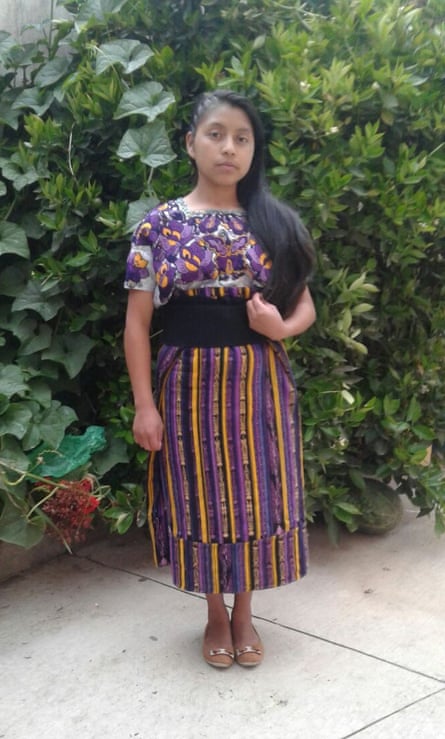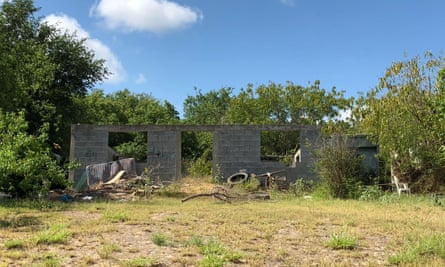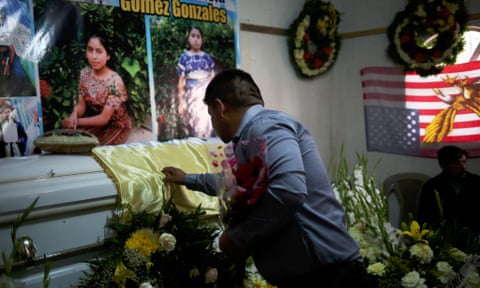When Claudia Gómez was a little girl she would climb fruit trees for cherries and apricots, and chase her friends through the lush corn fields scattered across the hills of their village in western Guatemala.
Her family remember her as a warm-hearted and mischievous girl who was riveted by mathematics from an early age, and who would sing to her two younger sisters as she braided their long black hair.
“My daughter was naughty and cuddly and playful. She loved to draw and sing,” said Lidia González, 39, who was wrapped in a traditional woven shawl and headscarf against the chilly night at the family home.
As she spoke, González gazed sadly at a makeshift shrine: a wide open basket containing a photograph of Claudia, surrounded by candles and bunches of long-stemmed white chrysanthemums.
“Claudia was a good girl and a good student. My daughter didn’t do anything wrong, it’s not fair that immigration killed her – why did they do that?” she said.
It is over a week since 20-year-old Claudia Patricia Gómez González was shot in the head by a US Customs and Border Patrol (CBP) agent in Rio Bravo, Texas, and no one has provided answers for her grief-stricken mother.

“It doesn’t make sense,” Gonzalez said, speaking in the indigenous Mayan Mam language through an interpreter. “We spoke the day before she died – and she was excited and happy.” San Juan Ostuncalco is sprawling collection of mostly Mam communities scattered amid the forest-clad mountains outside Guatemala’s second largest city Quetzaltenango.
This region was the setting for repeated atrocities by government forces during the country’s 36-year civil war that left 200,000 civilians dead – most of them indigenous – and triggered a wave of forced migration to the US in the 1980s.
More recently, those refugees have been followed by a new generation of migrants, driven from home by extreme economic hardship, government neglect and corruption. Up to a third of some rural populations have travelled north, through Mexico, towards the US, and in 2017, Guatemalans living abroad sent home a record $8bn in remittances, accounting for 10% of the country’s GDP.
The tell-tale signs of migration are everywhere. Rural town centres are packed with fast food joints and malls, and the winding potholed roads are peppered with American-style concrete houses – including the Gómez family home.
Like many children in this region, Gómez saw little of her father growing up because he spent years in the US as an undocumented migrant until he was deported last year.
She was raised by a tight network of female relatives; by 12, she had mastered the skill of making tortillas by hand after copying her mother, aunts and grandmothers who all live close by.
In high school, Gómez played midfield in football and gave reggaeton dance lessons in between classes, homework, dating and heart-to-hearts with her friends. She was a devout Christian who recently swapped the family’s Catholic tradition for an evangelical church.
Life was hectic and full of possibilities. She graduated in 2016 with an accounting certificate, but the ambitious youngster was rejected by a string of banks and local businesses.
She applied to San Carlos University to study for an accounting degree but didn’t pass the tough entrance exam for a place at the country’s only public university; her family could not afford to send her to one of Guatemala’s many private universities.
After more than a year stuck at home with no job and no money, the future looked bleak. One by one, her school friends were giving up on work, to get married and have babies, but Gómez wanted more. “I’m going to America,” she told her parents firmly. “Don’t worry, I’ll be back in a few years.”
She left home in early May, excited about the impending adventure in the US, where she hoped to find work to pay for university – and be reunited with her boyfriend, who had made it to Virginia about a year earlier.
It was 3am when she hugged her grandmother Tomasa Vicente, 70, and told her: “Don’t worry abuela, I’ll be back soon – I promise.”
It is unclear what she knew about the increasing hostility towards migrants under Trump when she convinced an aunt in Atlanta to loan her money to pay the coyote, or guide, about $10,000.
“My niece left home like I did 18 years ago, because it’s the only way to escape poverty and move forward,” said the aunt, who asked for her name to be withheld for fear of deportation and separation from her US-born children.

“She wanted to live her dreams, make something of her life. I was waiting for her to call, but the call I got was to tell me she was dead. This is a nightmare. I am so sad.”
Gómez made the perilous journey through Mexico with five other youngsters from neighbouring rural communities. It was her first journey out of Quetzaltenango.
She was killed in Texas less than three weeks after leaving home.
Rio Bravo is a tiny, sparsely populated settlement well away from the legal ports of entry and border fences in Laredo.
It is a popular crossing point for undocumented migrants who make their way by raft or boat across the river that represents the dividing line between the US and Mexico.
The southern US border – with its inhospitable terrain and guards – is a treacherous place for migrants. A Guardian investigation published three weeks before Gómez was killed found that CPB agents used deadly force on at least 97 people in the past 15 years. Almost 73,000 Guatemalan families have been detained at that border in the past three years.
Gómez died in circumstances that remain unclear, in an overgrown lot framed by ramshackle homes. She was about a third of a mile from the border.
Border patrol initially said that an agent fired the fatal shot after a group of people he suspected of being undocumented resisted arrest and attacked him “using blunt objects”.
The shooting was witnessed and filmed by a neighbour who posted a video online.
Two days later, the CPB cancelled a press conference, and released a new statement in which some details were changed and there was no reference to “blunt objects”. It read: “According to the agent, the group ignored his verbal commands and instead rushed him.”
González was no longer described as an “assailant”, but a “member of the group,” it said.
Shortly after Gómez died, three of her travel companions were detained. They await deportation. The whereabouts of the other two is unknown.
The unnamed agent is on administrative leave while the FBI investigates.

When the Guardian visited Rio Bravo a week after Gómez’s death, four border patrol SUVs were stationed at the river’s edge while a police patrol car drove through the town.
It remains unclear why the CPB changed its story, but the agency did not respond to the Guardian’s questions.
Activists in the US have called for transparency in the case.
“I think people are sceptical that justice will happen,” said Sister Rosemary Welsh, who runs a migrant shelter in Laredo and a mobile health clinic that visits Rio Bravo. “My concern is that if there isn’t a really good investigation – and I have to believe that there will be – then it’ll cause more unrest.”
“Why was lethal force needed?” she asked.
José Saldana, 22, of the Laredo Immigrant Alliance, a recently-formed advocacy group, said: “They want to militarise the border but they don’t have the proper training.”
The unanswered questions have only added to the family’s grief back in Guatemala.
“What’s the agent’s name? Has he killed before?” said paternal aunt Dominga Vicente, 42, speaking at the family home as her youngest child slept wrapped in a sling on her back. “We ask God to bless the kind woman who filmed the scene, otherwise my niece would be just another disappeared migrant. Tell the Americans we want justice.”
At the family home, a towering cloud of smoke emanated from the open cooking fire as dozens of women prepared corn tamales, black beans and huge pots of chicken stew.
Thanks to donations from friends, neighbours and relatives – the simple feast will feed hundreds of mourners accompanying the parents as they bring home Gomez’s body to its final resting place.
Claudia Gómez will be buried on Saturday; returned to mother earth where Mayans believe life begins. Vigils have also been held in Rio Bravo and in Alexandria, Virginia, where Gómez hoped to be reunited with her boyfriend.
Her grandmother Tomasa Vicente recalls her last goodbye, grasping on to her listener’s arm with a wrinkled hand.
“She was so happy and excited to go, but my heart was heavy. ‘Please be careful, I told her, stay in touch, and pray to God to keep you safe,’” she said. “She promised to come home but now she’s gone forever.”









